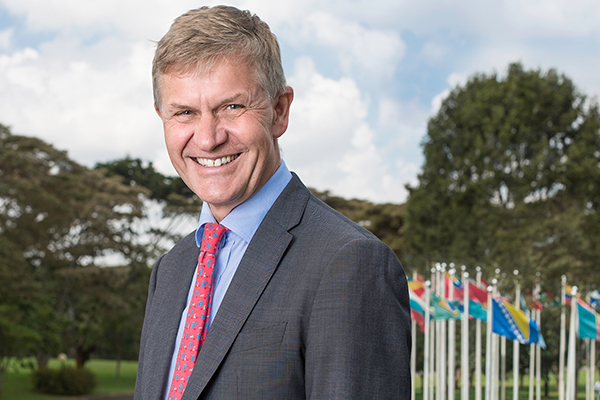I’d followed Berta’s fight to protect indigenous lands in Honduras, and I shared in the outpouring of grief across the world in the wake of her brutal murder. She was a high-profile activist with a strong support network, celebrated nationally and an inspiration to embattled activists around the world. But none of this protected her from the nefarious forces whose plans to build a hydro-electric dam on Lenca land she thwarted. She was aware of the risks, but she did not relent. She was remarkably brave.
Berta’s murder solidified our resolve to do more to support environmental defenders around the world. We’d been engaged for years at UN Environment in the more arcane legal and regulatory end-of-things. It can be painstaking work, but worth every effort. Without well-designed laws there’s no foundation for environmental protection.
With Berta’s murder the time had however come to build on that foundation. One way of doing this was to focus more on rights and access to information. We wanted to find a way to bring environmental protection closer to the people, and especially those most vulnerable to exploitation.
In many parts of the world access to justice still goes hand-in-hand with access to influence and resources. Sadly, those who struggle to protect natural resources and their traditional way of life are often left to be celebrated in death for their efforts, rather than supported in life for their work. This is despite the fact that since the 1970s, environmental rights have grown more rapidly than any other human right. They are currently enshrined in over 100 constitutions, and courts in at least 44 nations are issuing decisions enforcing the constitutional right to a healthy environment.
Two disturbing counter-trends are undermining these advancements. The first is the escalating harassment, intimidation and murder of environmental defenders. Between 2002 and 2013, 908 people were killed in 35 countries defending the environment and land, and the pace of killing is increasing; 2017 was even worse. The second are the attempts by some countries to limit the activities of non-governmental organizations and civil society. Between 1993 and 2016, 48 countries enacted laws that restricted the activities of local NGOs receiving foreign funding, and 63 countries adopted laws restricting the activities of foreign NGOs.
To stop the murders and the muzzling, those whose rights are threatened by state or corporate actors must be allowed to participate in decision-making that disproportionately affects them. We are fully committed to widening citizens’ access to information, because when empowered, every citizen can exercise his or her right to a healthy environment and respect the laws that seek to protect it. When citizens are guaranteed access to justice they are enabled to expose the wrongdoings of those who abuse the environment.
States need to fulfil environmental rights and refuse to tolerate the intimidation of environmental defenders which undermines basic human rights and environmental rule of law. That is why we work with countries to promote transparency and accountability in judiciaries, legislatures and policy making institutions. But we also have to uphold our end of the bargain at the United Nations. In many ways the UN is lagging behind some states when it comes to environmental rights. I’d like to see the United Nations recognise, as some countries have done, the global right to a healthy environment because human rights and environmental rights are inseparable.
We’re pushing for greater visibility for environmental rights issues. We launched our Environmental Rights Initiative in March at the 37thSession of the Human Rights Council, building on UN Environment’s Defenders Policy. We want to form a coalition of environmental rights champions who can join us in denouncing rights violations, demanding justice, and lending defenders a bigger voice.
The initiative is also helping governments to put the right policies and laws in place to protect environmental rights. And we’re not forgetting business. If corporations can push beyond a culture of basic compliance to one where they also champion environmental rights, it would go a long way to safeguarding lives and land from abuses. Individuals also have a role to play in reporting violations to their local authorities and calling on their governments to promote, protect and respect environmental rights.
None of this would be possible without the close cooperation of the Office of the UN High Commissioner for Human Rights. Together, our two organisations are working to identify and promote good practices on human rights and the environment. At the same time, we’re sensitizing the judiciary on constitutional environmental rights, and providing support for regional negotiations on a Principle 10 instrument for the Latin American and Caribbean region.
It is only by following rhetoric with action, policy with implementation, and law with enforcement that we can overcome the challenges before us and create a future in which every person who cares about his or her environment has the opportunity to protect, restore and conserve it.
Erik Solheim is the Executive Director of UN Environment and the former Minister of the Environment and International Development for Norway. Follow him on Twitter @ErikSolheim.
Photo: UN Environment




